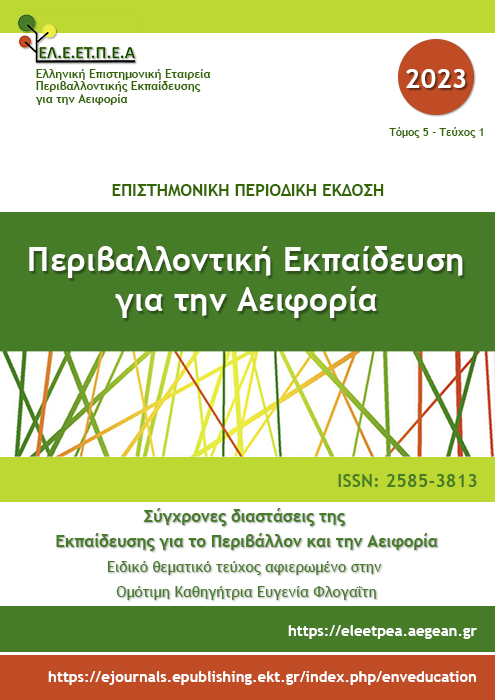Εκπαιδευτικοί Οργανισμοί Μάθησης για την αναζήτηση της αειφορίας

Περίληψη
Η αειφορία και η αειφόρος ανάπτυξη προτάθηκαν ως η καταλληλότερη λύση για την αντιμετώπιση των περιβαλλοντικών, κοινωνικών και οικονομικών προβλημάτων τα οποία οφείλονται στις επιλογές, τις αξίες και τους θεσμούς της βιομηχανικής εποχής. Στη μετάβαση προς την αειφορία μπορούν να συνεισφέρουν οι διάφοροι οργανισμοί, όταν λειτουργούν ως Οργανισμοί Μάθησης, δηλαδή όταν υιοθετούν μια δυναμική μαθησιακή διαδικασία αυτοαμφισβήτησης και αναζήτησης νέων γνώσεων και πρακτικών. Ένας από τους στόχους της Εκπαίδευσης για το Περιβάλλον και την Αειφορία είναι να διαμορφώσει ανθρώπους πολιτικά γραμματισμένους και ικανούς να σκέφτονται με όρους αλλαγής. Προκύπτει συνεπώς η ανάγκη εφαρμογής μιας στρατηγικής μάθησης που στοχεύει στην αλλαγή της ατομικής και της συλλογικής κοσμοθεωρίας. Οι Εκπαιδευτικοί Οργανισμοί Μάθησης μπορούν να οικοδομήσουν τη μάθηση που θα διευκολύνει τη στροφή προς την αειφορία, καθώς δεν επιδιώκουν εξ αρχής ένα προκαθορισμένο αποτέλεσμα, δεν εγκλωβίζονται στη στείρα αναμετάδοση γνώσεων και την αναπαραγωγή κοινωνικών μοντέλων. Αντίθετα, νομιμοποιούν την αμφισβήτηση και την ανατροπή απαξιωμένων συντηρητικών δομών και αξιακών πλαισίων, υποστηρίζοντας τους εκπαιδευόμενους να αναζητήσουν την αειφορία, αλληλεπιδρώντας με τις τοπικές κοινωνικο-πολιτιστικές συνθήκες.
Λεπτομέρειες άρθρου
- Πώς να δημιουργήσετε Αναφορές
-
Νομικού Χ. (2023). Εκπαιδευτικοί Οργανισμοί Μάθησης για την αναζήτηση της αειφορίας. Περιβαλλοντική Εκπαίδευση για την Αειφορία, 5(1), 189–199. https://doi.org/10.12681/ees.35781
- Ενότητα
- Articles

Αυτή η εργασία είναι αδειοδοτημένη υπό το CC Αναφορά Δημιουργού – Μη Εμπορική Χρήση – Παρόμοια Διανομή 4.0.
Οι συγγραφείς διατηρούν τα πνευματικά δικαιώματα και παρέχουν στο περιοδικό το δικαίωμα της πρώτης δημοσίευσης μαζί με την αδειοδότηση της εργασίας με CC-BY-NC-SA, που επιτρέπει σε άλλους να μοιράζονται αυτή την εργασία με αναγνώριση του συγγραφικού δικαιώματος και την αρχική δημοσίευση σε αυτό το περιοδικό.

